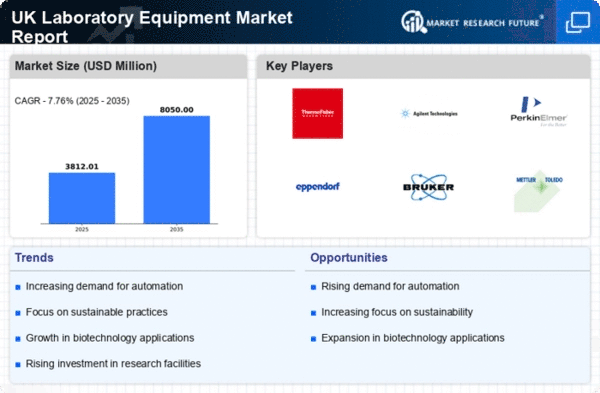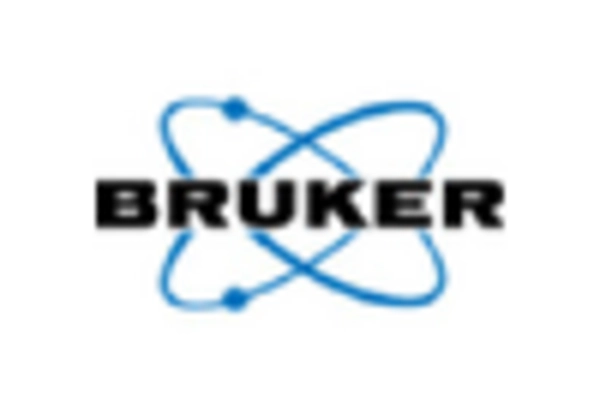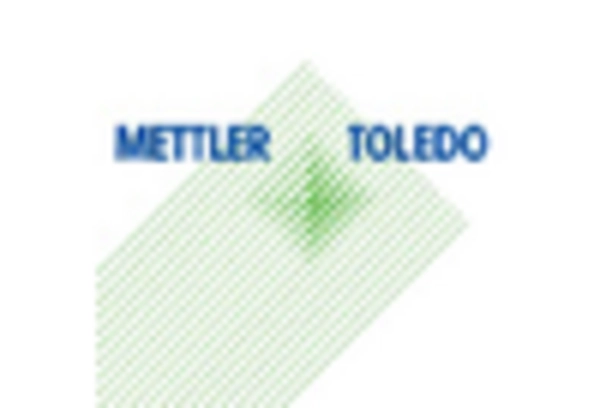Growing Focus on Quality Control
Quality control remains a critical aspect of laboratory operations, driving the laboratory equipment market in the UK. Industries such as pharmaceuticals, food and beverage, and chemicals are increasingly prioritising stringent quality assurance measures to comply with regulatory standards. The demand for laboratory equipment that ensures accurate testing and analysis is therefore on the rise. In 2025, the market for quality control laboratory equipment is anticipated to account for approximately 30% of the overall laboratory equipment market. This trend indicates a shift towards investing in reliable and precise instruments, which is essential for maintaining product integrity and safety. As a result, manufacturers are likely to innovate and enhance their offerings to meet these quality demands.
Expansion of Biotechnology Sector
The laboratory equipment market is benefiting from the rapid expansion of the biotechnology sector in the UK. With advancements in genetic research, drug development, and personalized medicine, the demand for specialized laboratory equipment is increasing. The biotechnology industry is projected to grow at a CAGR of 7% through 2026, which is likely to drive the laboratory equipment market as well. This growth is attributed to the need for sophisticated tools and technologies that facilitate complex biological analyses. As biotechnology firms invest in state-of-the-art laboratory equipment to support their research and development efforts, the laboratory equipment market is expected to witness substantial growth, reflecting the sector's overall expansion.
Rising Demand for Advanced Research
The laboratory equipment market is experiencing a notable increase in demand driven by the need for advanced research capabilities across various sectors, including pharmaceuticals, biotechnology, and environmental science. As research institutions and laboratories strive to enhance their analytical capabilities, the market for sophisticated laboratory equipment is projected to grow. In the UK, the market is expected to reach approximately £2.5 billion by 2026, reflecting a compound annual growth rate (CAGR) of around 5.2%. This growth is largely attributed to the increasing focus on innovation and the development of new products, which necessitate the use of advanced laboratory equipment. Consequently, manufacturers are investing in cutting-edge technologies to meet the evolving needs of researchers, thereby propelling the laboratory equipment market forward.
Emergence of Automation in Laboratories
The integration of automation technologies in laboratories is reshaping the landscape of the laboratory equipment market. Automation enhances efficiency, reduces human error, and increases throughput, making it an attractive option for laboratories aiming to optimise their operations. In the UK, the automation segment of the laboratory equipment market is projected to grow at a CAGR of 6.5% over the next five years. This growth is driven by the increasing adoption of automated systems for sample analysis, data management, and equipment control. As laboratories seek to streamline their processes and improve productivity, the demand for automated laboratory equipment is expected to rise, thereby influencing the overall market dynamics.
Increased Funding for Scientific Research
The laboratory equipment market is significantly influenced by the rise in funding for scientific research initiatives in the UK. Government and private sector investments are on the rise, with funding for research and development (R&D) projected to exceed £40 billion by 2025. This influx of capital is likely to enhance the capabilities of laboratories, leading to increased procurement of advanced laboratory equipment. As institutions seek to improve their research outputs, the demand for high-quality equipment is expected to surge. This trend not only supports the growth of the laboratory equipment market but also fosters innovation and collaboration among research entities, ultimately contributing to advancements in various scientific fields.

















